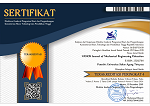- » Focus and Scope
- » Section Policies
- » Peer Review Process
- » Open Access Policy
- » Archiving
- » Publication Etics
- » Article Processing Charges (APCs)
- » Screening for Plagiarism Policy
- » Journal Scientific Statement
- » Retraction
Focus and Scope
VANOS Journal of Mechanical Engineering Education contains the results of research related to the development of curriculum, teaching, learning, policy, media, and evaluation in the field of Technology and Vocational Education, Mechanical Engineering Education, Automotive Engineering Education, Mechanical Engineering, Automotive Engineering
Section Policies
Articles
Peer Review Process
The research manuscript submitted to this online journal will be blind review with peer-reviewed at least 2 (two) reviewers. The accepted research articles will be available online following the journal peer-reviewing process. Language used in this journal is English.
Open Access Policy
This journal provides immediate open access to its content on the principle that making research freely available to the public supports a greater global exchange of knowledge.
Archiving
This journal utilizes the LOCKSS system to create a distributed archiving system among participating libraries and permits those libraries to create permanent archives of the journal for purposes of preservation and restoration. More...
Publication Etics
Journal VANOS (P-ISSN 2528-2611 da E-ISSN 2528-2700) is a blind review with peer-reviewed journal published by Department of Mechanical Engineering Education, Faculty of Teacher Training and Education, University of Sultan Ageng Tirtayasa in collaboration with Asosiasi Dosen dan Guru Vokasi Indonesia (ADGVI) - Association of Indonesian Vocational Educators (AIVE). The publication ethics of VANOS Journal of Mechanical Engineering Education as follows:
- The manuscript presents complete and original information as well as objective data.
- Quotation source and reference cited in the manuscript must be in the bibliography.
- The manuscript is written concisely and clearly for efficiency.
- The manuscript has never been published in another journal.
- Everyone involved in the research (students, supervisors, and other members) should be included in the team of writers.
- A writer who passed away should be included as a co-author.
- Authors must avoid fabrication (make up the data and results of a study).
- Authors must avoid falsification (manipulating research materials, equipment, process, changing the data or intentionally discarding data or results).
- Authors should avoid Plagiarism (taking ideas, processes, results or words without citing the sources).
- Authors should avoid Fragmentation (breaking research data into different themes of manuscript so that the discussion cannot become in-depth)
- The manuscript should not use copied materials from another article without permission.
- All materials/quotation earned from previous research, involving similar writers related to previous publications must be cited properly.
Article Processing Charges (APCs)
This journal charges the following author fees:
Article Submission: 0.00 (IDR)
Article Publication: 250000.00 (IDR)
Screening for Plagiarism Policy
This journal has a policy of screening for plagiarism. We use Anti-Plagiarism Software "Turnitin" to check the authenticity article.

Journal Scientific Statement
The articles published in VANOS Journal of Mechanical Engineering Education are scientifically proved following the code of ethics of scientific publication. The code of ethics itself upholds three values of ethics in publications, namely, (1) Neutrality (free from conflicts of interest in public management), (2) Justice (giving the right of authorship to the beneficiary as the author), and (3) Honesty (free from duplication, fabrication, falsification and plagiarism (DF2P) in the publication. The articles published also follow the certain procedures or orders, such as double blind review and revision process that consistent with the journal’s regular review, to ensure that the quality is maintained properly.
Retraction
The papers published in VANOS Journal of Mechanical Engineering Education will be consider to retract in the publication if :
- They have clear evidence that the findings are unreliable, either as a result of misconduct (e.g. data fabri-cation) or honest error (e.g. miscalculation or experimental error)
- the findings have previously been published elsewhere without proper crossreferencing, permission orjustification (i.e. cases of redundant publication)
- it constitutes plagiarism
- it reports unethical research
The mechanism of retraction follow the Retraction Guidelines of Committee on Publication Ethics (COPE) which can be accessed at https://publicationethics.org/files/retraction%20guidelines.pdf.


.png)
.png)

